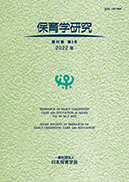Volume 60, Issue 3
Displaying 1-11 of 11 articles from this issue
- |<
- <
- 1
- >
- >|
Part I Special Topic Articles
General Remarks
-
2022Volume 60Issue 3 Pages 5-9
Published: 2022
Released on J-STAGE: March 27, 2023
Download PDF (1270K)
Articles
-
2022Volume 60Issue 3 Pages 11-22
Published: 2022
Released on J-STAGE: March 27, 2023
Download PDF (1656K) -
2022Volume 60Issue 3 Pages 23-34
Published: 2022
Released on J-STAGE: March 27, 2023
Download PDF (1610K)
Part II Specoal Reports ftom committees
Report on the 21st Symposium Organized by the International Relation Committee
-
2022Volume 60Issue 3 Pages 37-46
Published: 2022
Released on J-STAGE: March 27, 2023
Download PDF (1290K)
Part III Progress in Early Childhood Care and Education (II)
-
2022Volume 60Issue 3 Pages 49-62
Published: 2022
Released on J-STAGE: March 27, 2023
Download PDF (1303K) -
2022Volume 60Issue 3 Pages 63-80
Published: 2022
Released on J-STAGE: March 27, 2023
Download PDF (1316K) -
2022Volume 60Issue 3 Pages 81-83
Published: 2022
Released on J-STAGE: March 27, 2023
Download PDF (1258K) -
2022Volume 60Issue 3 Pages 84-
Published: 2022
Released on J-STAGE: March 27, 2023
Download PDF (1013K)
Contents
-
2022Volume 60Issue 3 Pages 86-
Published: 2022
Released on J-STAGE: March 27, 2023
Download PDF (408K)
Afterword
-
2022Volume 60Issue 3 Pages 87-
Published: 2022
Released on J-STAGE: March 27, 2023
Download PDF (1021K)
publication data
-
2022Volume 60Issue 3 Pages 88-
Published: 2022
Released on J-STAGE: March 27, 2023
Download PDF (1012K)
- |<
- <
- 1
- >
- >|
